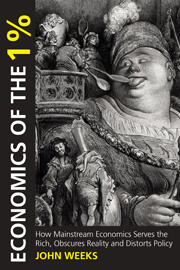Book contents
- Frontmatter
- Dedication
- Contents
- Preface: Doctor Bob's Third Law
- Introduction: Economic Ignorance
- Chapter 1 Fakeconomics and Economics
- Chapter 2 Market Worship
- Chapter 3 Finance and Criminality
- Chapter 4 Selling Market Myths
- Chapter 5 Riches, “Sovereignty” and “Free Trade”
- Chapter 6 Lies about Government
- Chapter 7 Deficit Disorders and Debt Delirium
- Chapter 8 Governments Cause Inflation?
- Chapter 9 Institutionalized Misery: Austerity in Practice
- Chapter 10 Economics of the 99%
- Notes
- Index
Chapter 10 - Economics of the 99%
Published online by Cambridge University Press: 05 April 2014
- Frontmatter
- Dedication
- Contents
- Preface: Doctor Bob's Third Law
- Introduction: Economic Ignorance
- Chapter 1 Fakeconomics and Economics
- Chapter 2 Market Worship
- Chapter 3 Finance and Criminality
- Chapter 4 Selling Market Myths
- Chapter 5 Riches, “Sovereignty” and “Free Trade”
- Chapter 6 Lies about Government
- Chapter 7 Deficit Disorders and Debt Delirium
- Chapter 8 Governments Cause Inflation?
- Chapter 9 Institutionalized Misery: Austerity in Practice
- Chapter 10 Economics of the 99%
- Notes
- Index
Summary
Wealth Accumulates and Democracy Decays
Ill fares the land, to hastening ills a prey,
Where wealth accumulates, and men decay:
Princes and lords may flourish, or may fade;
A breath can make them, as a breath has made;
But a bold peasantry, their country's pride,
When once destroyed can never be supplied.
…
But times are altered; trade's unfeeling train
Usurp the land and dispossess the swain;
(Oliver Goldsmith, The Deserted Village, 1770)The enforcement of fiscal austerity qualifies as the single most important public policy consequence of the abandonment of economics in favor of fakeconomics. Acceptance of austerity by the public in almost every major advanced country is even more perversely impressive than the austerity itself. Anyone born after 1960 must find it hard to believe that once, long ago it seems, the belief in balanced budgets did not drive public finances, nor did governments agonize over and quake in breathless anticipation of the “verdict of financial markets” on their policy decisions.
The overthrow of rigor and common sense in what we once called the economics profession did not cause this seismic shift in the ideology of public policy. We can trace the chronology of causality quite clearly, especially in Britain and the US. The cause lies in the secular decline of trade union influence and the parallel rise in the power of capital. Aneurin (“Nye”) Bevan, tireless Welsh campaigner for the rights of working people, stated the danger succinctly.
- Type
- Chapter
- Information
- Economics of the 1%How Mainstream Economics Serves the Rich, Obscures Reality and Distorts Policy, pp. 185 - 204Publisher: Anthem PressPrint publication year: 2014



